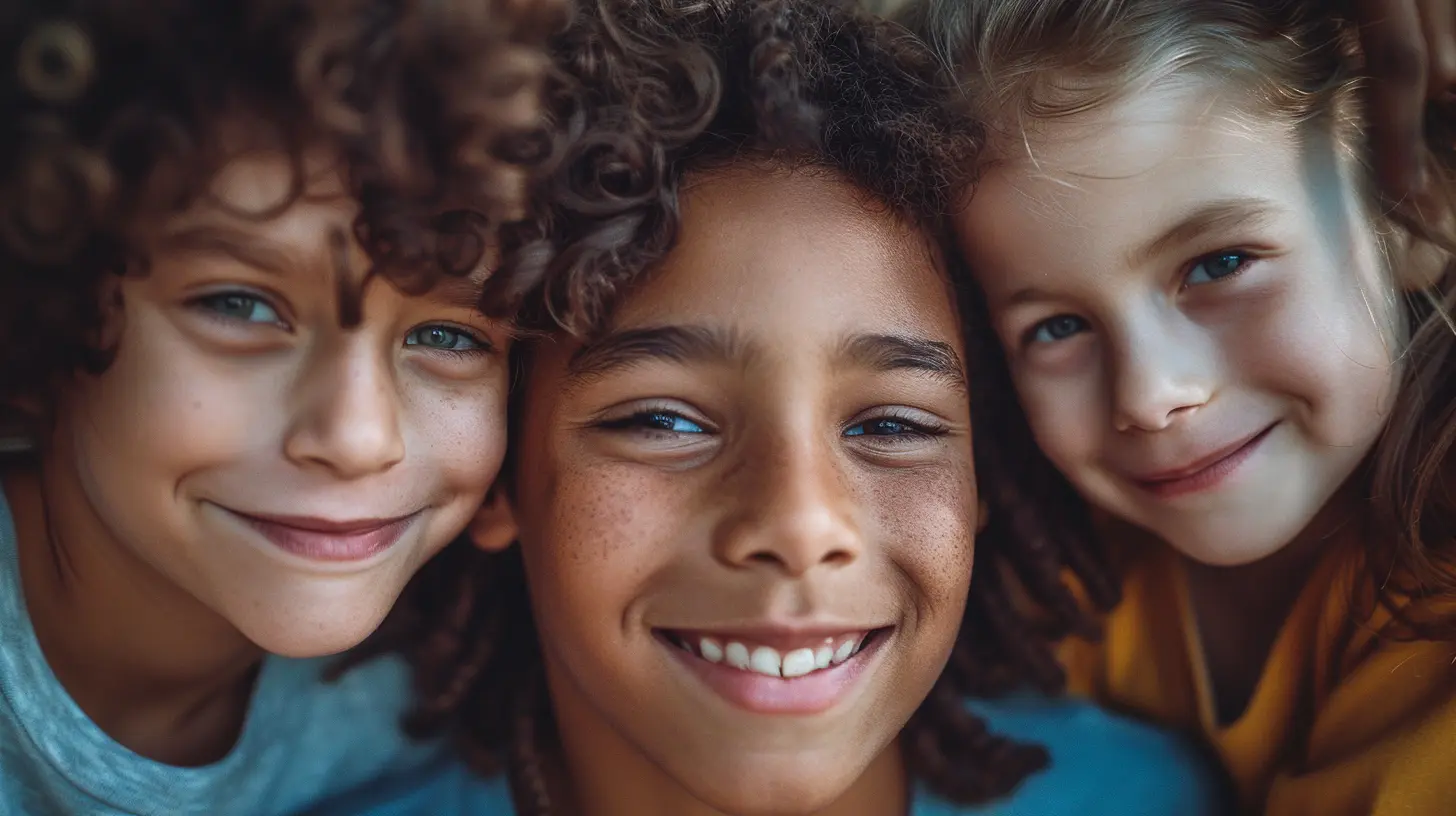Encouraging Empathy and Compassion in Kids
3 January 2025
Picture this: your kid just snatched a toy truck away from another kid at the park. The other kid starts crying, but your kid? Oh, your kid looks like they just secured the last cookie on the kitchen counter—proud as a peacock. And in that glorious moment, you realize... empathy? Never heard of her. Compassion? Who is she?
So, how do you turn your little cookie thief into someone who not only understands how others feel but actually cares? Lucky for you, we’re diving into the (sometimes maddening, sometimes heartwarming) world of raising empathetic and compassionate humans. Buckle up; it's gonna be a bumpy ride fueled by eye rolls, “Why, Mom?!” moments, and the occasional bribe disguised as dessert. 
Why Empathy and Compassion Are Basically Superpowers
If empathy and compassion were Avengers, they’d be the underappreciated heroes who actually save the day without smashing buildings in the process—every. single. time.Empathy is all about stepping into someone else's shoes, not literally (unless your toddler is raiding the closet again), but emotionally. Compassion takes it up a notch; it’s feeling those feelings and wanting to do something about it.
Here’s the thing: kids aren’t born wired for empathy. Nope, they don’t pop out of the womb thinking, “Hmm, I wonder if my screaming at 2 a.m. is ruining my mom’s life right now.” It’s a skill—a messy, sometimes painfully slow-to-develop skill—that you, dear parent, get to teach. Yay?
Empathy Starts at Home (Spoiler: It's Mostly on You)
1. Model It Like a Pro
Look, kids are like sponges—except instead of absorbing water, they absorb everything you do and say. So, if you’re showing empathy in your daily life, guess who’s watching? That’s right. Tiny humans with big ears and no concept of privacy.Next time someone cuts you off in traffic instead of yelling, “Nice blinker, buddy!” (guilty), try saying, “Wow, maybe they’re in a rush; hope everything’s okay.” See what we did there? Instant empathy, baby.
2. Teach Feelings Without Making It Awkward
Kids can’t empathize if they don’t understand what emotions are. You wouldn’t send them to a spelling bee without teaching them the alphabet first, right? Same thing here.Start with the basics: happy, sad, mad. Then sprinkle in some advanced-level feelings like frustrated, excited, and jealous. Use books, movies, or even their epic playground meltdowns as teaching moments. “Oh, you’re angry because your cookie broke in half? That must be frustrating!” Now, they’ll know how to label it next time. 
Compassion in Action: Getting Kids to Actually Do Something
3. Make It Fun (Because Kids Are Tiny Hedonists)
Newsflash: kids don’t care about being good people simply for the sake of it. No five-year-old has ever thought, “I can’t wait to grow my moral fiber today!” So, make it fun.Start small:
- Ask them to make a card for Grandma when she’s feeling sick.
- Turn giving away old toys into a game: “Pick three toys that will make another kid super happy.”
- Volunteer as a family, but make it age-appropriate. Feeding the homeless might be too heavy for a toddler, but helping at a pet shelter? Jackpot. Puppies = instant motivation.
If you make compassion feel like a chore, they’ll tune out faster than you can say, “Clean your room.”
4. Encourage Perspective-Taking (a.k.a. Mind-Reading for Beginners)
Perspective-taking is empathy’s cousin—the cool one who understands everyone’s side of the story. Ask questions like, “How do you think your friend felt when you took their crayon?” or “What do you think the dog is feeling right now?”Warning: You might get some hilarious—or completely bonkers—answers at first. (“The dog is sad because he wants to be a cat.” Sure, okay, buddy.) But over time, they’ll get it. 
When They Mess Up (Because They Will, and That’s Okay)
5. Focus on the Behavior, Not the Kid
Your kid isn’t a “mean person” just because they shoved their sibling over a LEGO disagreement. What they did was mean, but that’s not who they are. See the difference?Instead of, “You’re so mean!” try, “That wasn’t kind. How can we make it right?” Then prepare for the world’s longest apology—because if kids are anything, they’re professional stalling experts.
6. Don’t Force Fake Apologies
Every parent has been there: kid A hits kid B, so you demand an apology. Kid A grumbles through clenched teeth, barely spitting out, “Soooorrrry.” Mission accomplished? Not even close.Instead of forcing it, help them connect the dots. “How do you think they’re feeling right now? What can you do to make them feel better?” Let the apology (and hopefully some actual regret) come naturally.
Technology: Friend or Foe?
Ah, the digital age—where kids can swipe before they can write and think FaceTime is a legit playdate. Technology isn’t the devil, but it can either nurture or nuke their empathy skills, depending on how you handle it.7. Be Picky About Media
Not all screen time is created equal. Shows with strong characters and emotional storylines can teach empathy way better than sugary nonsense that rots their brains (looking at you, Baby Shark). Pro tip: Watch with them and talk about what’s happening.“Wow, Daniel Tiger looks really upset. Why do you think that is?” Boom, instant teachable moment without the lecture vibes.
8. Limit Mindless Scrolling
Here’s the deal: If your kid spends three hours doom-scrolling TikTok, they’re not exactly flexing their empathy muscles. Set boundaries and encourage face-to-face interactions whenever possible. Remember those? People talking without screens in their hands? Wild concept, I know.Celebrate the Wins (Even the Tiny Ones)
Did your kid offer half their sandwich to a friend? Did they comfort their sibling after breaking their LEGO castle (even if it was their fault)? Celebrate it like they just won an Oscar.Positive reinforcement works wonders. And let’s be honest, as parents, we could all use a little more positivity, too. So, give yourself a pat on the back while you’re at it. Teaching this stuff is no walk in the park—or if it is, it’s a park where someone stole your parking spot, a dog ate your picnic, and your toddler is on their third tantrum of the day.
Final Thoughts
Raising empathetic and compassionate kids isn’t about turning them into little saints (spoiler: that’s impossible). It’s about giving them the tools to connect with others, navigate their emotions, and maybe—just maybe—not grow up into total jerks.Will they nail it every time? Nope. Will you? Also nope. But every time you catch your kid putting someone else’s feelings first, it’s a reminder that all those awkward conversations and eye-twitch-inducing teaching moments are actually paying off.
And hey, if all else fails, there’s always chocolate—a universal motivator for kids and parents.
all images in this post were generated using AI tools
Category:
Mental HealthAuthor:

Maya Underwood
Discussion
rate this article
13 comments
Astraea Parker
This article offers a fascinating perspective on nurturing empathy in children! I'm curious about specific activities or daily practices that can effectively instill these values. How do we balance teaching empathy without overwhelming kids? Looking forward to exploring practical tips and engaging ideas in the comments!
February 2, 2025 at 5:30 PM

Maya Underwood
Thank you for your thoughts! Simple daily practices like discussing feelings, role-playing scenarios, and encouraging acts of kindness can be very effective. Balancing instruction with play and open dialogue helps keep it engaging without overwhelming them. Looking forward to sharing more ideas!
Oscar Kelly
What a wonderful article! Teaching kids empathy and compassion shapes a brighter future. Simple acts of kindness can make a huge difference in their lives and those around them. Love these insights!
January 31, 2025 at 5:12 AM

Maya Underwood
Thank you so much for your kind words! I'm glad you found the insights valuable—every small act of kindness truly counts!
Trinity Lynch
What a fascinating topic! I’m curious about the specific activities or strategies you recommend for fostering empathy in young children. Are there particular books or games that have proven effective? I’d love to hear more about real-life examples that have successfully nurtured compassion in kids. Thanks for sharing your insights!
January 28, 2025 at 4:37 PM

Maya Underwood
Thank you for your interest! For fostering empathy in young children, I recommend reading books like "Have You Filled a Bucket Today?" and engaging in role-playing games that encourage perspective-taking. Activities like volunteering or simple acts of kindness can also be effective. Real-life examples include classroom projects focused on community service, which help children understand and act on compassion.
Zephyrian McDermott
Great insights! Fostering empathy and compassion in children is essential for their emotional development and helps build a kinder future.
January 26, 2025 at 4:12 PM

Maya Underwood
Thank you! I completely agree—nurturing empathy in children is vital for a more compassionate future.
Jane Morris
What a wonderful article! Teaching our kids empathy and compassion is a beautiful gift that will shape their hearts and the world around them. Let's nurture kindness together—what a joy! 🌟
January 23, 2025 at 4:40 AM

Maya Underwood
Thank you so much for your kind words! I completely agree—nurturing empathy and compassion in our children is vital for a brighter future. 🌼
Edith McNaughton
Empowering our children to embrace empathy and compassion shapes a brighter future. Every small act of kindness they learn today seeds a more understanding world tomorrow!
January 19, 2025 at 3:48 PM

Maya Underwood
Thank you! Indeed, nurturing empathy in children is crucial for fostering a more compassionate and understanding society. Every act matters!
Laura Strickland
Teaching kids empathy: like herding cats, but with more heart and fewer furballs! 🐾❤️
January 16, 2025 at 4:32 PM

Maya Underwood
Absolutely! Instilling empathy in kids may be challenging, but the rewards are invaluable. Their hearts grow, and so does our hope for a kinder future! 🐾❤️
Rhett Bryant
Great insights! Fostering empathy in children is essential for their development. Simple acts of kindness and open conversations can make a significant difference. Thank you!
January 15, 2025 at 3:26 AM

Maya Underwood
Thank you for your thoughtful comment! I completely agree—simple acts of kindness and open conversations can truly shape empathetic individuals.
Zayden McLain
Thank you for this insightful article on fostering empathy in children. Your practical tips and real-life examples provide a valuable roadmap for parents. Cultivating compassion at a young age not only enhances children's emotional intelligence but also contributes to a more understanding and connected society. I appreciate your thoughtful approach!
January 7, 2025 at 4:20 PM

Maya Underwood
Thank you for your kind words! I’m glad you found the article helpful in fostering empathy in children. Together, we can make a positive impact!
Payton Weber
Empathy: the original superhero power! 🦸♂️
January 7, 2025 at 4:19 AM

Maya Underwood
Absolutely! Empathy is indeed a superpower that can transform lives and build stronger connections. 🌟
Ivory Collins
Thank you for these valuable insights! Fostering empathy in children is essential for their growth.
January 6, 2025 at 3:42 PM

Maya Underwood
Thank you! I'm glad you found the insights valuable. Fostering empathy truly makes a significant impact on children's development.
Rook Cruz
Model empathy consistently; children learn best through example.
January 6, 2025 at 3:28 AM

Maya Underwood
Absolutely! Children are keen observers and often mirror the behaviors they see. Modeling empathy in our interactions sets a powerful example for them to follow.
Niva Robinson
What a thought-provoking article! I’m curious about practical ways to integrate empathy-building activities into daily routines. Are there specific games or stories you recommend that can spark conversations about compassion? I would love to hear more about nurturing these values in everyday life!
January 3, 2025 at 4:29 AM

Maya Underwood
Thank you for your interest! Incorporating empathy-building activities can be fun and engaging. Consider games like "Feelings Charades" where kids act out emotions, or reading books like *Last Stop on Market Street* that spark discussions about compassion. Simple storytelling and role-playing can also nurture these values in daily life.
MORE POSTS

How to Create a Chore Routine That Works for Your Family

Identifying Early Signs of Giftedness in Children

Instilling a Growth Mindset in Children

Growing Responsibility: Transitioning from Small to Big Chores

Managing Parental Stress: Simple Self-Care Tips That Work

How Chores Teach Financial Literacy and Budgeting

Understanding Executive Function Skills in Young Children

Teaching Kids About Responsibility Through Home Activities

Preparing Your Child for Adolescence: A Mental Health Primer